World
State of the Union: Antisemitism rises, COP28 & EU-China summit
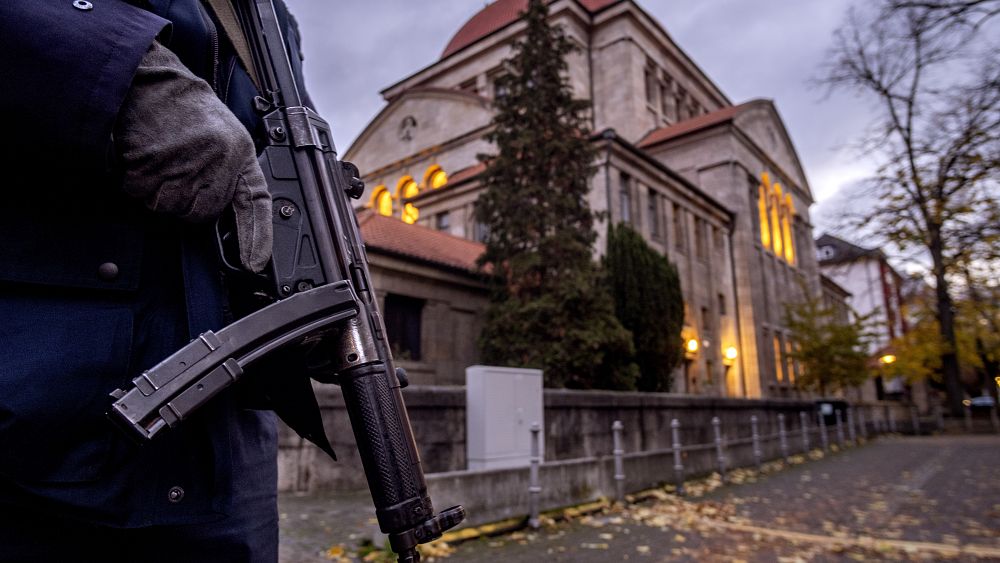
The war between Israel and Hamas continues to poison the atmosphere in our societies, with the number of hate crimes rising to alarming levels.
Last month, the Netherlands recorded an 800% increase in antisemitic incidents and Austria a 300% rise.
In the second half of October, the number of anti-Muslim incidents in Germany increased to three a day on average.
In response this week, the European Commission urgently unveiled a set of measures and policy recommendations to tackle the dark demon of hate.
But that’s not all. Ylva Johansson, the European Commissioner for Home Affairs, also announced new funding.
“With the war between Israel and Hamas and the polarisation it causes in our society, with the upcoming holiday season, there is a huge risk of terrorist attacks in the European Union,” she told reporters in Brussels on Tuesday.
“We will now make available an additional €30 million of protection.”
That money is allocated specially for the protection of churches during the Christmas period, but also of synagogues and mosques.
And then there is the public discourse. Politicians are having to weigh their words carefully in order not to be accused of bias and taking sides with either Israel or the Palestinians.
Otherwise, there could be an immediate backlash, as EU High Representative, Josep Borrell, found out this week when members of an audience he was speaking to left the room, seemingly in response to what he said about the war.
For many, talking about the conflict in the Middle East, at home or in public, has become a frustrating exercise.
And the EU’s answer to the war is being seen as disappointing, one way or the other.
COP28 goes on
Disappointing is also the word that best describes the mood of climate activists who are following the COP28 conference in Dubai.
Not only are they angry at the fossil fuel dealmaking of the host country, but they generally believe that the conference has not lived up to its ambitions.
While climate change is a global crisis, it impacts poorer countries in the global south particularly.
The International Rescue Committee (IRC), founded at the call of Albert Einstein, has made lobbying on behalf of those countries the core of its climate work.
Euronews spoke with the IRC’s president and CEO, David Miliband, who described his organisation’s report,‘Climate Action for the Epicenter of Crisis: How COP28 Can Address the Injustices Facing Conflict-Affected Countries’, and what needs to be done to help vulnerable regions.
“Our report is specifically focused on the countries that are combining high levels of climate vulnerability with high levels of conflict. There are 15 or 16 countries in the world that represent about 60% of humanitarian needs. And they’re marked by conflict and by the climate crisis,” the former UK foreign secretary said in an interview.
“Somalia would be an example. Central African Republic, Ethiopia. These are climate-stressed countries that in the main have contributed very little to overall carbon emissions, but are suffering from very high levels of climate vulnerability and very low levels of investment in climate resilience.”
“We need proper risk mapping. We need real investment in innovation about what adaptation means. How can farming communities sustain livelihoods? How can urban communities be insulated from the dangers of the climate crisis?
“Thirdly, fragile and conflict states need you to work through civil society, through community, not just through traditional government mechanisms. And then there’s a final aspect to this. These countries need humanitarian aid, but they need climate finance.”
Brussels heads to Beijing
For the first time in over four years, an in-person EU-China summit was held, this time in Beijing.
European Commission President, Ursula von der Leyen, who travelled alongside European Council President, Charles Michel, labelled it a summit of choices and it did not produce much beyond that.
By far the biggest issue of the day was the huge trade imbalance Europe faces with the Asian giant, which currently stands at nearly €400 billion.
Von der Leyen told reporters in the Chinese capital that the EU will no longer turn a blind eye to this deficit.
“Politically, European leaders will not be able to tolerate that our industrial base is undermined by unfair competition,” she said on Thursday.
“We like competition, it makes us better, it lowers prices, it’s good for the consumers. But competition needs to be fair. We insist on fair competition within the single market. Therefore, we also insist on fair competition from companies that come to our single market.”
Tensions between Brussels and Beijing have steadily risen over the past year, as the EU seeks to de-risk its economy from China.
In September, the Commission opened up a probe into subsidised Chinese electric cars entering the bloc’s market, riling Beijing in the process.
At the summit, Chinese President Xi Jinping himself warned Europe not to implement protectionist trade policies, but at the same time, the door was left open to a deepening of ties.
For Grzegorz Stec, an analyst from MERICS, a think-tank currently sanctioned by China, the summit may not have delivered much, but it has set the EU’s tone for Beijing that if it does not take action, then Europe will respond.
“It seemed that the EU has put on the table the fact that it really wants China to engage constructively, and if not, it’s going to take action,” Stec told Euronews.
“It’s very much a signal that the EU side is expecting action to happen soon. On the Chinese side, if not, then our relationship might get a little bit more complex in terms of European responses.”

World
Consejos para disfrutar de las celebraciones de fin de año, sin estrés
NUEVA YORK (AP) — Todos conocemos los factores de estrés: obligaciones sociales, rencillas familiares, divisiones políticas, estrés financiero y el deseo de mantenerse alegre y generoso todo el tiempo.
Así que aquí va un recordatorio sobre cómo desterrar a tu perfeccionista interior y disfrutar verdaderamente de la temporada festiva:
“Realmente ayuda dejar de lado algunos de los ‘deberías’”, dice Lynn F. Bufka, jefa de práctica de la Asociación Estadounidense de Psicología. “Decide cuál es la cosa que más importa, y las cosas que te brindan más alegría, y suelta las demás”.
Las tradiciones pueden cambiar y evolucionar, y cuanto más flexibles sean las cosas, más fácil será para todos, dice Bufka.
“Concentra tu energía en crear un espacio cálido para que las personas que amas se reúnan y relajen, se pongan al día y celebren unos a otros. Eso es literalmente todo lo que importa”, concuerda Lauren Iannotti, editora en jefe de Real Simple.
Algunos consejos:
Concéntrate en lo que te hace feliz
Podrías decidir que la conversación es tu objetivo principal y no preocuparte en absoluto por la decoración, dice Bufka. O si la decoración de la mesa es lo que amas, invierte tu energía allí y no te preocupes tanto por otros aspectos.
“Idealmente, debería tratarse de enfocarse en el amor, y eso no significa lo mismo para todos”, dice Bufka.
Permite que otros hagan las cosas por ti.
“La gente quiere ayudar, ¡déjalos!”, dice Iannotti. “Si no te ENCANTA cocinar todas esas guarniciones, o tienes poco tiempo, no hay ninguna vergüenza en aceptar que tu hermana haga el relleno. O busca ayuda de los profesionales: apoya a un restaurante local haciendo un pedido de catering”.
Otra opción es que “cada uno traiga un plato distintivo”, dice Ianotti. “Ahorrarás tiempo y dinero en la preparación y la cocina y tus invitados podrán mostrar sus habilidades”.
Darte permiso para tomar atajos
“Está bien si la casa está un poco desordenada o si la cena se sirve unos minutos tarde”, dice Iannotti. “Si las personas que has invitado están más interesadas en evaluar tu desempeño que en pasar un buen rato, pueden discutirlo con su terapeuta”. (Por cierto, no lo están, añade ella).
Y no dudes en dejar que la gente se sirva por sí misma, cuando sea posible. “Si no tienes tiempo para jugar a ser el barman, crea una bebida insignia con anticipación que puedas servir a todos tus invitados. También puedes simplemente dejar algunos mezcladores para que los invitados se sirvan y hagan sus propias creaciones”, sugiere Caroline Utz, directora editorial y de estrategia en The Spruce.
Está bien tener tiempo a solas
Las cosas funcionarán lo suficientemente bien si no lo supervisas todo, así que cuídate. Tómate pausas o caminatas si eso te ayuda a mantenerte centrado.
“Aunque el mindfulness se está convirtiendo en un término demasiado utilizado en la sociedad actual, hay algo valioso que podemos tomar de esto y aplicar a la temporada de fin de año”, dice Brook Choulet, psiquiatra deportiva y de rendimiento de concierge y fundadora de Choulet Performance Psychiatry.
Ella recomienda “programar microdescansos intencionales” para hacer algo que disfrutes.
“Por ejemplo, podrías programar una llamada telefónica con un amigo de otro estado, tomar un paseo de 15 minutos al aire libre, o incluso ajustar el temporizador y tomar un baño de 15 minutos sin interrupciones”, dijo.
Espera algo de discordia y no te alarmes por ello
“Si te preocupa la polarización y entrar en conversaciones incómodas, intenta pensar en maneras en que puedas terminar una conversación o cambiarla de dirección”, dice Bufka.
Ella recomienda preparar algunas frases de antemano para ayudar a terminar la conversación o cambiarla de dirección.
En resumen, tener la intención de una temporada festiva menos perfecta puede ser justo lo que necesitas.
___
Katherine Roth cubre temas de vida y estilo y otros temas para The Associated Press desde Nueva York.
___
Esta historia fue traducida del inglés por un editor de AP con la ayuda de una herramienta de inteligencia artificial generativa.
World
Azerbaijan Airlines plane headed to Russia crashes hundreds of miles off course, dozens feared dead
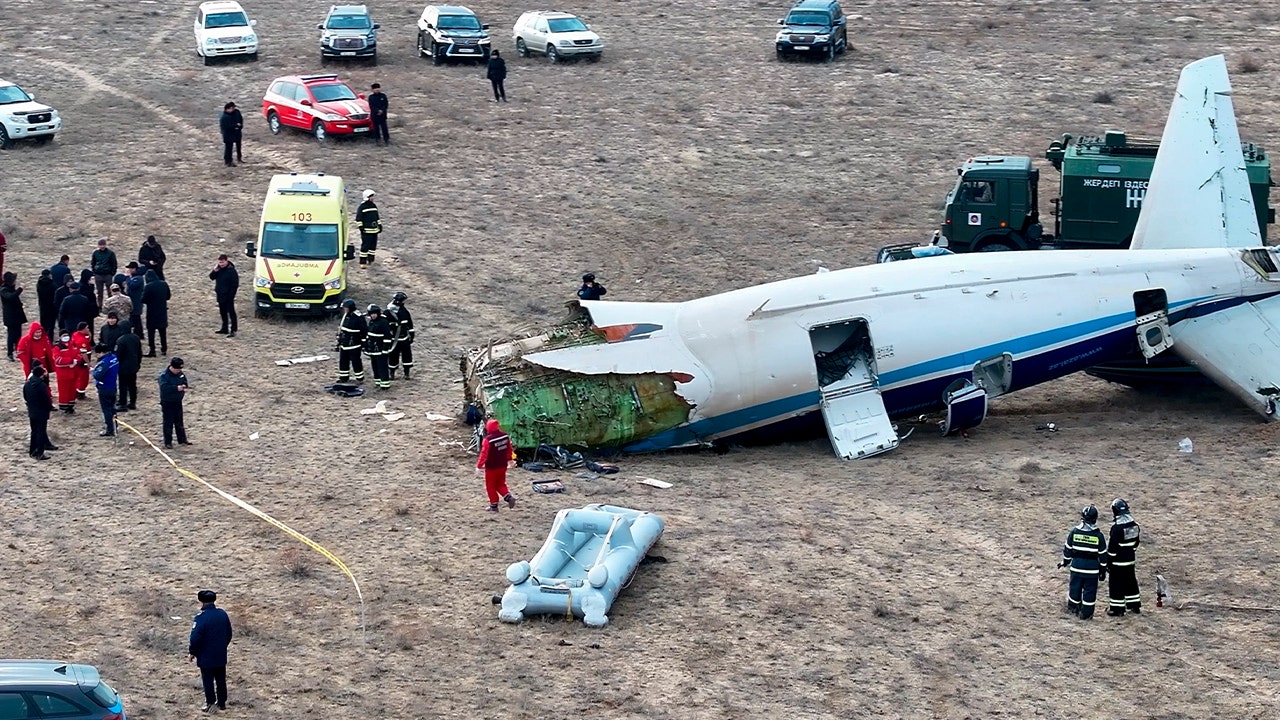
Dozens of passengers are feared dead after an Azerbaijan Airlines flight crashed near the city of Aktau in Kazakhstan on Wednesday, reports say.
The Embraer 190 passenger jet flying from Azerbaijan to Russia had 62 passengers and five crew on board, Kazakh authorities announced, saying 32 survivors had been rescued.
Flight J2-8243 had flown hundreds of miles off its scheduled route to crash on the opposite shore of the Caspian Sea. Officials did not immediately explain why it had crossed the sea, but the crash came shortly after drone strikes hit southern Russia. Drone activity has shut airports in the area in the past and the nearest Russian airport on the plane’s flight path was closed on Wednesday morning.
Russia’s aviation watchdog, meanwhile, said it was an emergency that may have been caused by a bird strike.
MORE THAN 30 DEAD IN BRAZIL BUS AND TRUCK COLLISION
In this photo taken from a video released by the administration of Mangystau region, the wreckage of Azerbaijan Airlines Embraer 190 lies on the ground near the airport of Aktau, Kazakhstan, Wednesday, Dec. 25, 2024. (The Administration of Mangystau Region/AP Photo)
Those aboard the plane included 42 Azerbaijani citizens, 16 Russian nationals, six Kazakhstani and three Kyrgyzstani citizens, according to Kazakhstani officials.
Russian news agency Interfax reported that both pilots died in the crash, citing a preliminary assessment by emergency workers at the scene. The news agency also quoted medical workers who stated that four bodies had been recovered from the crash so far.
A total of 29 survivors, including two children, have been hospitalized, the ministry told Russia’s state news agency, RIA Novosti, the Associated Press reported. Many passengers have yet to be accounted for.
MALAYSIA AGREES TO RESUME ‘NO FIND, NO FEE’ HUNT FOR FLIGHT MH370, 10 YEARS AFTER PLANE DISAPPEARED
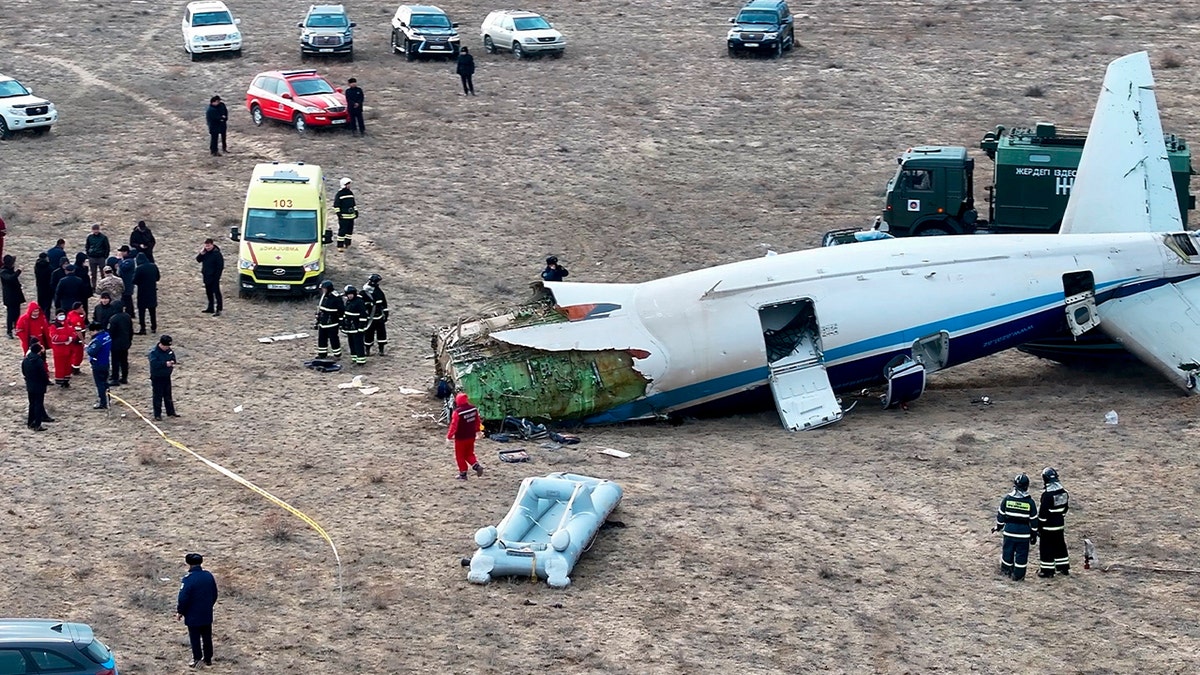
More than 30 are feared dead following the crash near the Kazakhstani city of Aktau. (Azamat Sarsenbayev/AP Photo)
Video of the crash showed the plane descending rapidly before bursting into flames as it hit the seashore, and thick black smoke then rising, Reuters reported. Bloodied and bruised passengers could be seen stumbling from a piece of the fuselage that had remained intact.
Azerbaijani President Ilham Aliyev, who had been traveling to Russia, returned to Azerbaijan upon hearing news of the crash, the president’s press service said. Aliyev was due to attend an informal meeting of leaders of the Commonwealth of Independent States, a bloc of former Soviet countries founded after the collapse of the Soviet Union, in St. Petersburg.
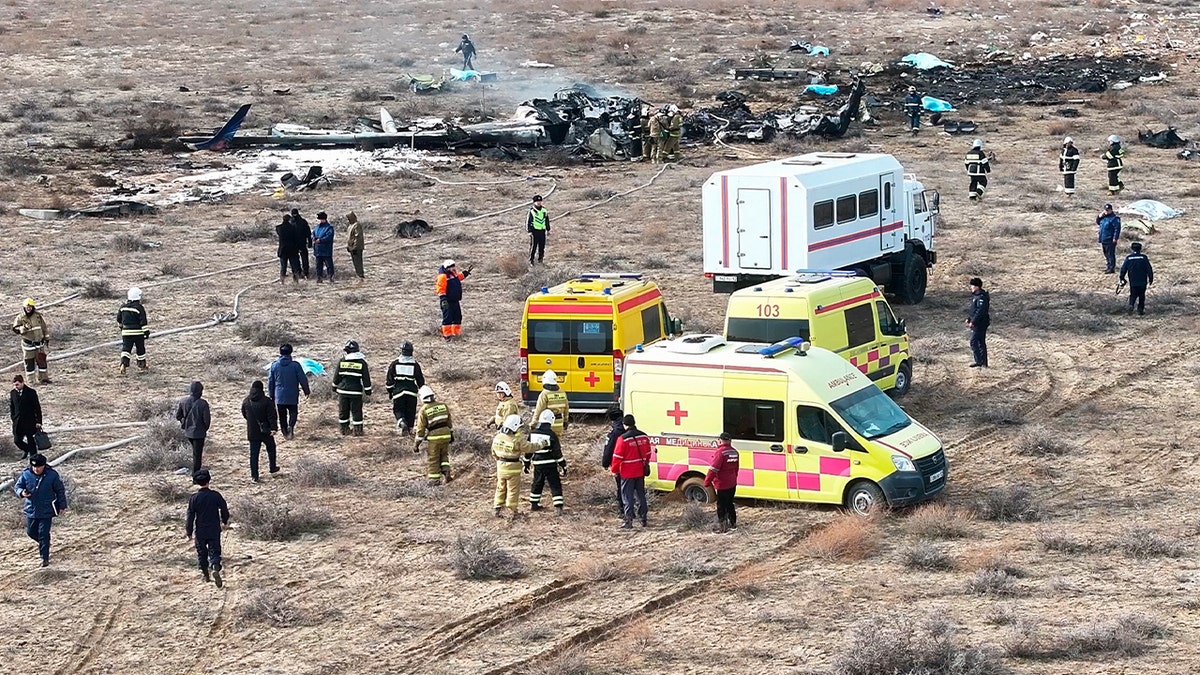
Emergency crews at the site of the Azerbaijani airliner crash on Dec. 25, 2024. (Azamat Sarsenbayev/AP Photo)
Aliyev expressed his condolences to the families of the victims in a statement on social media.
“It is with deep sadness that I express my condolences to the families of the victims and wish a speedy recovery to those injured,” he wrote.
He also signed a decree declaring Dec. 26 a day of mourning in Azerbaijan.
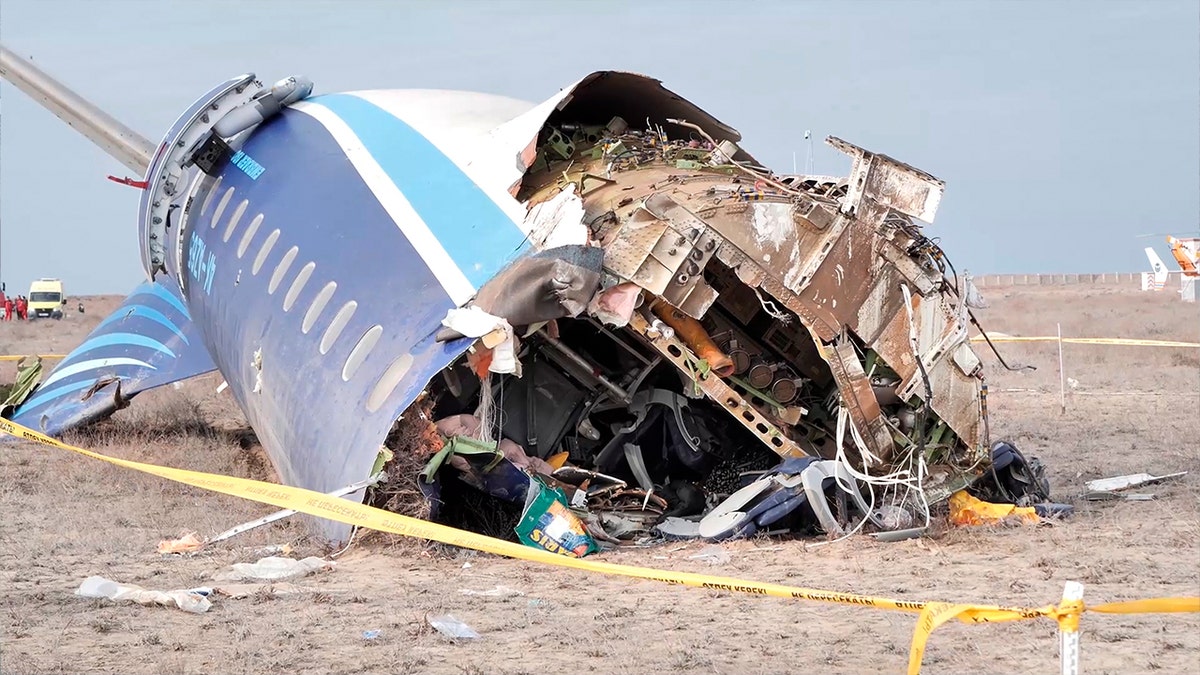
The plane was en route from the Azerbaijani capital of Baku to the Russian city of Grozny in the North Caucasus, the Associated Press reports. (The Administration of Mangystau Region/AP Photo)
In a statement, Azerbaijan Airlines said it would keep members of the public updated and changed its social media banners to solid black.
“We ask God for mercy on the passengers and crew members who lost their lives,” a translated statement on X said. “Their pain is our pain. We wish a speedy recovery to those injured.”
Reuters and the Associated Press contributed to this report.
World
Who is Europe's top investor in space in 2023?

Luxembourg remains Europe’s top investor in space in a year when defence spending on space exceeded civil space budgets for the first time since the 1990s.
Global public investment in space hit a record high of €106 billion in 2023, an 11% increase compared to 2022.
In Europe, the total funding was €11.9 billion, showing a modest 1% rise in its share of global space investment.
According to the European Space Agency, defence spending on space exceeded civil space budgets last year for the first time since the 1990s. Defence expenditures in space are projected to grow faster than civil spending, making up 53% of the budget in 2024.
The US continues to dominate global space investment, accounting for 64% of the total budget, while China holds a strong second place, growing its share from an estimated 2% in 2000 to 12% in 2023 through long-term programmes in both civil and defence.
Europe ranks third, contributing 11% of the global space budget in 2023.
What share of their GDP do EU countries spend on public space budgets?
Luxembourg remains Europe’s leading investor in space, dedicating 0.135% of its Gross Domestic Product (GDP) to the sector.
Globally, the country ranks third behind the US (0.262%) and Russia (0.169%).
In Europe, Luxembourg is followed by France, which invests 0.167% of its GDP, Italy at 0.103%, and Belgium at 0.095%.
On the other hand, private investment in space has continued to decline in 2023, dropping by 32% compared to 2022.
Europe also saw a 14% decrease in 2023 compared to the year before, with private space ventures receiving just below €980 million.
Although the US accounts for most of the global decline in 2023, its space sector continues to attract the largest share of investments at 60%, followed by Europe with 16% and China with 9%.
What was the state of space activity in 2023?
There were 221 orbital launches in 2023, an 18% increase compared to 2022.
Yet, a total of 212 launches were successful.
The US carried out more than half of the launches, with 96 of them conducted by SpaceX.
China accounted for 30% with 67 launches, a 5% increase from 2022, and Russia completed 19 launches.
The European launch service provider conducted three launches in 2023, including Europe’s first mission to Jupiter, which aimed to explore whether the planet’s three moons — Callisto, Europa, and Ganymede — could support life in their oceans.
Video editor • Mert Can Yilmaz
-
/cdn.vox-cdn.com/uploads/chorus_asset/file/24924653/236780_Google_AntiTrust_Trial_Custom_Art_CVirginia__0003_1.png)
/cdn.vox-cdn.com/uploads/chorus_asset/file/24924653/236780_Google_AntiTrust_Trial_Custom_Art_CVirginia__0003_1.png) Technology5 days ago
Technology5 days agoGoogle’s counteroffer to the government trying to break it up is unbundling Android apps
-

 News6 days ago
News6 days agoNovo Nordisk shares tumble as weight-loss drug trial data disappoints
-

 Politics6 days ago
Politics6 days agoIllegal immigrant sexually abused child in the U.S. after being removed from the country five times
-

 Entertainment6 days ago
Entertainment6 days ago'It's a little holiday gift': Inside the Weeknd's free Santa Monica show for his biggest fans
-

 Lifestyle6 days ago
Lifestyle6 days agoThink you can't dance? Get up and try these tips in our comic. We dare you!
-

 Technology1 week ago
Technology1 week agoFox News AI Newsletter: OpenAI responds to Elon Musk's lawsuit
-
/cdn.vox-cdn.com/uploads/chorus_asset/file/25672934/Metaphor_Key_Art_Horizontal.png)
/cdn.vox-cdn.com/uploads/chorus_asset/file/25672934/Metaphor_Key_Art_Horizontal.png) Technology1 day ago
Technology1 day agoThere’s a reason Metaphor: ReFantanzio’s battle music sounds as cool as it does
-

 News2 days ago
News2 days agoFrance’s new premier selects Eric Lombard as finance minister


















